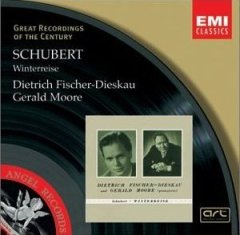Franz Schubert – Winterreise (Fischer-Dieskau) [2002]
Franz Schubert – Winterreise (Fischer-Dieskau) [2002]

1. Gute Nacht 2. Die Wetterfahne 3. Gefror'ne Tranen 4. Erstarrung 5. Der Lindenbaum 6. Wasserflut 7. Auf Dem Flusse 8. Ruckblick 9. Irrlicht 10. Rast 11. Fruhlingstraum 12. Einsamkeit 13. Die Post 14. Der Greise Kopf 15. Die Krahe 16. Letzte Hoffnung 17. Im Dorfe 18. Der stürmische Morgen 19. Täuschung 20. Der Wegweiser 21. Die Wirthaus 22. Mut 23. Die Nebensonnen 24. Der Leiermann Dietrich Fischer-Dieskau - baritone Gerald Moore - piano
The breadth of scholarly approaches to Franz Schubert's song cycle Die Winterreise testifies to the structural and dramatic complexity of the work; assessments range from complicated graphs, complete with interlocking axes and cryptic semantic labels, to outright sighs of resignation over the work's intractability. Perhaps this intrigue is what attracts performers and academics alike to the work; singer and scholar Michael Besack traces the ambiguous dramatic trajectory of Schubert's cycle back to antiquity. "Epic poetry and the tragic theater never produced a story with a moral," he pointed out.
A central question concerning the cycle is whether it really is one. The two dozen poems by Wilhelm Müller that Schubert took as his texts appeared piecemeal in three separate publications between 1822 and the completion of Schubert's setting in 1827; Müller's third publication, finally bearing the title Schubert would adopt, featured the newest poems along with the ones previously published (though the latter were reordered). The chronology of Schubert's setting also calls the idea of a continuous cyclical narrative into question: he set Müller's initial 12 songs early in 1827, then completed the other dozen later that year. Still, while some of the individual songs are frequently performed alone, one can easily read a composite story into the cycle. Literary scholar Cecilia Baumann describes the work as "a simple story of a rejected lover who leaves the town where his love resides and sets out in winter on an aimless journey." Schubert biographer Jacques Chailley reads a different kind of journey: "not simply that of a scorned lover -- he is only a phantom -- but an image behind which one can discern at each moment the journey of man toward the tomb: Die Winterreise is the sinister voyage of life." Such existential ideas gain support from the bleakness of Auf dem Flusse (At the River), in which the lover's description of the frozen stream seems to shade into one of a physical corpse, and of the melancholy hurdy-gurdy-man's lament that ends the cycle.
The songs ruminate on, rather than depict, events that have befallen the rejected lover; as the first two lines of the first song indicate ("A stranger I came hither, a stranger hence I go"), the journey has already taken place: the famous fifth song, Der Lindenbaum, likewise centers on symbols of remembrance. Schubert's introduction establishes a tranquil major mode with an airy, fluttering accompaniment; it becomes apparent that this figure represents the rustling of the eponymous lime tree. "Upon its bark when musing, fond words of love I made," the wanderer tells listeners, "and joy alike and sorrow still drew me to its shade." Only briefly do the mode and mood of the music change to minor, in direct correlation to the image of passing the tree in darkness. These pictorial elements lie only on the surface, however. Certain musical elements create a sense of geographical and chronological remove: the rustling figure is constantly interrupted by a leap up to a quaint stepwise descent; the echo of a "hunting horn" figure suggests distance -- spatial and temporal; the wind blows off the wanderer's hat, but he trudges forward without even turning around. The cold wind listeners that it is winter; the presence of leaves is unlikely. The rustling sound is not a real, but an imagined, phenomenon: "Now many leagues I'm far from/The dear old linden tree/[But still] I ever hear it murmur/'Peace thou wouldst find with me.'" Schubert's song does not evoke images; it evokes the act of remembering images. ---Jeremy Grimshaw, Rovi
download: uploaded yandex 4shared mediafire solidfiles mega zalivalka filecloudio anonfiles oboom
Last Updated (Monday, 28 April 2014 20:33)








